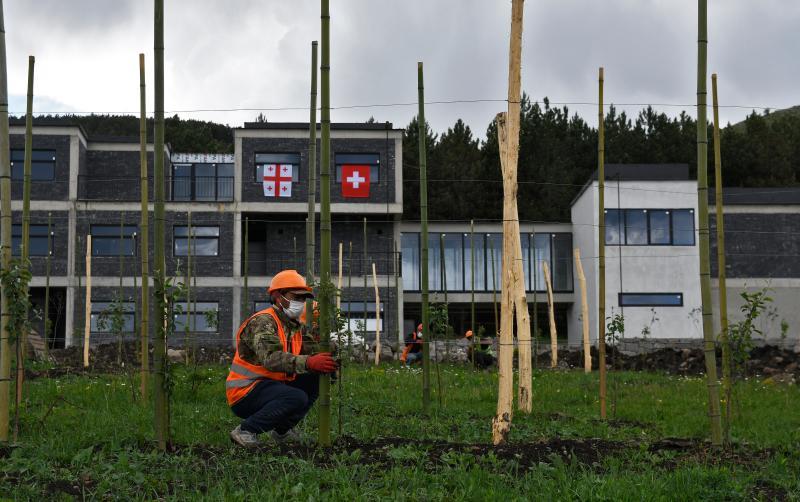Georgian farmers get EU backing with a loan that helps a partnership with a Swiss agricultural school train them
Agriculture is a big part of the Georgian national identity. Half of the country’s territory is agricultural land and about the same percentage of the labour force works in the sector, almost all self-employed on small farms.
But productivity is low and farmers often face poverty. To strengthen agriculture and increase know-how, a vocational school is opening in Sarkineti, a village high in the mountains near Dmanisi, 120 km from the capital, Tbilisi. It’s a collaboration with a historic Swiss agricultural school.
“Natural conditions in Dmanisi are similar to those in Switzerland,” says Tinatin Makharadze, director of the school. “The region is vulnerable, so this project will revive life and create additional opportunities for income generation.”
The Swiss Agricultural School Caucasus will offer short and long-term courses in cattle breeding and dairy production, in collaboration with Switzerland’s Plantahof. A non-profit, private initiative, it will operate its own cheese factory and dairy farm, and will be financed through a loan from the Bank of Georgia, alongside grants from Swiss and Georgian partners, the Swiss Agency for Development and Cooperation and the United Nations Development Programme.
“The school’s contribution is very important to help Georgian agriculture and farmers have more of an international focus,” says Misha Kiphiani, a Principal Corporate Banker from Bank of Georgia. “The cheese to be produced at the school’s factory is in high demand in the Georgian market.”

Strengthening cooperation with a valued EU neighbour
The European Investment Bank signed a loan of €50 million with the Bank of Georgia for small and medium-sized enterprises (SMEs) and mid-caps, which was partially disbursed in 2020. In turn, Bank of Georgia lends the money to local entities, including the Swiss Agricultural School Caucasus.
This was the first loan from the EU bank to Bank of Georgia that was partially made available in local currency, which eliminates the risk of exchange rate exposure for the final beneficiary.
“The loan from the European Investment Bank has an immediate short- and long-term effect on the market,” says Levan Kobiashvili, Head of Funding Unit at Bank of Georgia. “It allowed us to transfer the benefit to our SME clients, who are an important part of our portfolio.”
Andreas Berkhoff, the loan officer at the European Investment Bank who worked on the deal, explains that providing attractive financing in local currency was possible due to grants from the European Commission under the Deep and Comprehensive Free Trade Area Initiative East.
“In Georgia, SMEs are a key part of the economy,” Berkhoff says. “We demonstrate that SMEs benefit from the cooperation between Georgia and the EU. To back them, we work hand in hand with the EU Delegation and the Commission under the Eastern Partnership framework”.
The EU support of SMEs in the Eastern Partnership countries is grouped under the EU4Business initiative. The European Investment Bank Group is a core partner of the initiative through different types of products:
- long-term funding from its own resources to banks for on-lending to SMEs and MidCaps. These loans typically benefit from guarantee support under the EU external lending mandate, and loans provided in local currency may be eligible for EU grants
- financing and technical advice to microfinance enterprises, using resources provided by the DCFTA Initiative East guarantee
- The EIB Group operates two SME guarantee instruments. The DCFTA Initiative East, offered in partnership with the European Investment Fund, is focused on access to finance, whereas the InnovFin Guarantee Facility, managed by the European Investment Fund, is dedicated to SMEs specialising in research and innovation under the Horizon 2020 programme
- In addition to loans, the EIB is offering Technical Assistance, to help banks improve their SME lending practices and increase their portfolio of projects with a climate angle. The TA is made possible by Member State donor contributions paid into an EIB trust fund.
“We are using a broad range of instruments, but also work through multiple channels, including smaller banks under the EIB Outreach Initiative, to extend our operations to underserved segments of the SME market,” says Berkhoff. “But the ultimate goal of all our activities is to make sure that SMEs, microenterprises and Mid-caps have access to finance and can realise their ideas.”
The European Investment Bank Group is part of Team Europe, an EU package dedicated to providing COVID-19 support to Georgia and other partner countries. This involves additional financing, made available rapidly and at more flexible terms, in order to help enterprises manage-and recover from-the crisis.
Thanks to Team Europe and in line with the EIB’s COVID-19 emergency measures, the EU Bank signed in December 2020 an additional loan of €25 million with the Bank of Georgia and applied flexible eligibility criteria to the operation with a total volume of €75 million.
Moving on to greener pastures
The first Swiss cheesemakers settled in Georgia in the late nineteenth century. Continuing this tradition, the Swiss Agricultural School will train up to 15 students each year, starting in spring 2021, on long-term courses, with up to 400 farmers on specialised, shorter courses.
The tuition fees for the students, who will mainly come from low-income families living in mountainous villages, will be largely covered by the private foundation that set up the school.
The school will also have its own modern campus and an onsite expert Swiss cheesemaker, leading the production and coaching the six-strong staff.
In the region’s pastures, which are ideal for cattle breeding, 50 cows imported from Switzerland will be fed naturally on the school’s farm. Their milk will be used to make the cheese in a 2 000-litre vat.
“It makes me really happy to see our project being realised,” says Makharadze. “We want to show local families they can use readily available resources and simple but effective methods to reproduce at home what they see in the school.